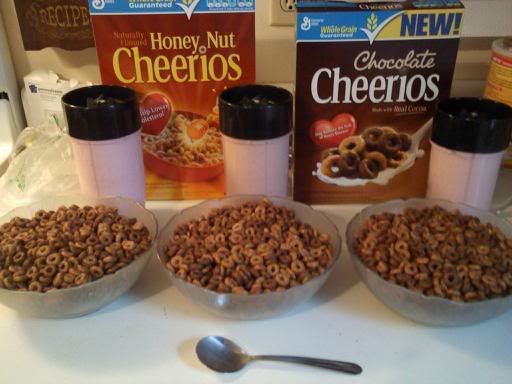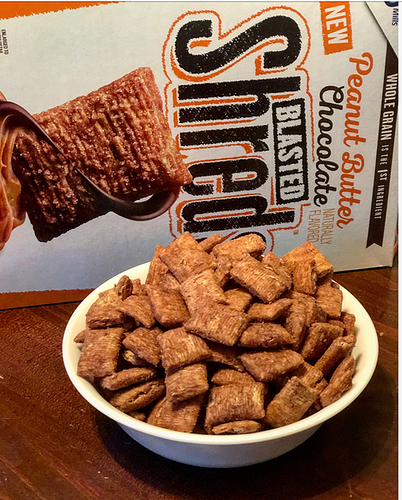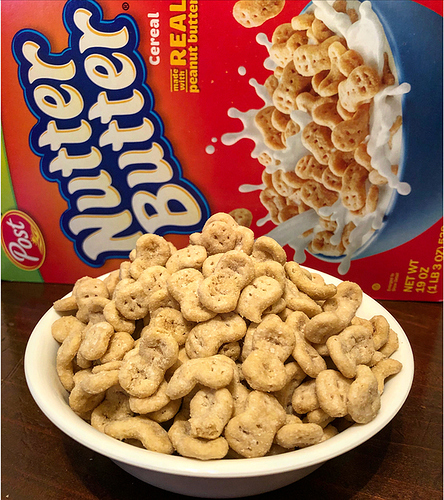What’s everyone’s thoughts on carb supplements with dextrose in it post workout? Beneficial or no and is it worth using? Most of them have pretty great reviews that I’ve seen but just don’t know if it’s something I would benefit from.
Beneficial? Yes.
Necessary to get as a supplement? No, buy a big bag of smarties they are nearly pure dextrose.
Modified carbs? Yes, depending on how much weight you put on it and your fundage.
Potatoes? Yes
Tl;dr carbs are good, carb supplements are expensive sugar
I used to think they were all garbage. I’d never buy dextrose, but cluster dextrin and carb 10 are great pre and intra workout.
Sugar/dextrose make me sick and crash midway through my workouts, cluster dextrin (like super carb) gives me quick carbs without the nasty insulin spike.
There’s a lot I could say here, but I’ll get to that tomorrow when I’m home instead of at work. Short story, don’t get dextrose or maltodextrin, those literally cost cents per pound, and if you get them from a supplement company, you’re just getting ripped off.
In agreement with Jeremy here.
Carb Supps for most people are unnecessary. Most people train with a pre-workout meal. Most studies done on insulin spiking or using high GI Carbs are those in 24+ hour fasted state or those training to be endurnace athletes. for the general gym goer who does a 1 hour workout you will never tap your glucose levels or totally deplete glucose levels were ingesting something along fthose lines is 100% Necessary. If you have extra calories and want to sip on some intra-workout can it hurt? No, but it is not 100% needed. Your just creating more insulin, and the net effect of spiking insulin again and again over time = increased and elevated insulni levels which can lead to a higher BG Reading which = fat storage. I know Dante is a huge advocate (Creator of DC Training) in limiting carbs to post (1st), then pre(2nd) and 2nd meal post (3rd) and then keeping other meals focused on P+F based meals to help control insulin sensitivity.
If you are going to get a Carb supplement HBCD or Waxy Maize or Carb 10 would be the best suggestions. Malto and Dextrose are basically sugar. Your better off just buying gatorade and drinking it.
For most of us who train with an intra-workout BCAA or pre-workout meal there is stil food overlap as i touched in the other thread, do we need to spike insulin? absolutely not, food is still digesting, aminos are still present, so do we really need simple carbs post-workout not really…
Could they be optimal … sure why not? but remember the total calories/macros if meeting your protein/fat/fiber minimums on a daily basis are optimal for your goal.
more:
The postexercise “anabolic window” is a highly misused & abused concept. Preworkout nutrition all but cancels the urgency, unless you’re an endurance athlete with multiple glycogen-depleting events in a single day. Getting down to brass tacks, a relatively recent study (Power et al. 2009) showed that a 45g dose of whey protein isolate takes appx 50 minutes to cause blood AA levels to peak. Resulting insulin levels, which peaked at 40 minutes after ingestion, remained at elevations known to max out the inhibition of muscle protein breakdown (15-30 mU/L) for 120 minutes after ingestion. This dose takes 3 hours for insulin & AA levels to return to baseline from the point of ingestion. The inclusion of carbs to this dose would cause AA & insulin levels to peak higher & stay elevated above baseline even longer.
So much for the anabolic peephole & the urgency to down AAs during your weight training workout; they are already seeping into circulation (& will continue to do so after your training bout is done). Even in the event that a preworkout meal is skipped, the anabolic effect of the postworkout meal is increased as a supercompensatory response (Deldicque et al, 2010). Moving on, another recent study (Staples et al, 2010) found that a substantial dose of carbohydrate (50g maltodextrin) added to 25g whey protein was unable to further increase postexercise net muscle protein balance compared to the protein dose without carbs. Again, this is not to say that adding carbs at this point is counterproductive, but it certainly doesn’t support the idea that you must get your lightning-fast postexercise carb orgy for optimal results.
To add to this… Why has the majority of longer-term research failed to show any meaningful differences in nutrient timing relative to the resistance training bout? It’s likely because the body is smarter than we give it credit for. Most people don’t know that as a result of a single training bout, the receptivity of muscle to protein dosing can persist for at least 24
Here’s what you’re not seeming to grasp: the “windows” for taking advantage of nutrient timing are not little peepholes. They’re more like bay windows of a mansion. You’re ignoring just how long the anabolic effects are of a typical mixed meal. Depending on the size of a meal, it takes a good 1-2 hours for circulating substrate levels to peak, and it takes a good 3-6 hours (or more) for everythng to drop back down to baseline.
You’re also ignoring the fact that the anabolic effects of a meal are maxed out at much lower levels than typical meals drive insulin & amino acids up to. Furthermore, you’re also ignoring the body’s ability of anabolic (& fat-oxidative) supercompensation when forced to work in the absence of fuels. So, metaphorically speaking, our physiology basically has the universe mapped out and you’re thinking it needs to be taught addition & subtraction.
More:
"You do not need to necessarily “spike” insulin for creatine to be maximally absorbed, but yes insulin is involved with the transport.
FYI: The insulin and creatine studies I have seen up to this point have involved taking the glucose 30 minutes after the creatine. This may be because the insulin release from the dextrose doesn’t entirely coincident with the pharmacokinetics of the creatine absorption.
Personally I think more consistent waves of insulin may be more anabolic than “spikes” anyway. This is because smoother waves of insulin more than likely affect ATP production more beneficially than “spikes” probably do. ATP is what rebuilds muscles and you want the most efficiency you can get here. I’m saying this because there is a delicate balance here between oxidative phosphorylation and lipogenesis (stimulated by acetyl COA carboxylase from HCO3-) in the mitochondrial in the presence of insulin. This “balance” I am talking about here is different for everyone though. Some people “shunt” over to lipgenesis so much sooner than other people. This has to do with other “global” processes happening in the body."
The postexercise “anabolic window” is a highly misused & abused concept. Preworkout nutrition all but cancels the urgency, unless you’re an endurance athlete with multiple glycogen-depleting events in a single day. Getting down to brass tacks, a relatively recent study (Power et al. 2009) showed that a 45g dose of whey protein isolate takes appx 50 minutes to cause blood AA levels to peak. Resulting insulin levels, which peaked at 40 minutes after ingestion, remained at elevations known to max out the inhibition of muscle protein breakdown (15-30 mU/L) for 120 minutes after ingestion. This dose takes 3 hours for insulin & AA levels to return to baseline from the point of ingestion. The inclusion of carbs to this dose would cause AA & insulinlevels to peak higher & stay elevated above baseline even longer.
So much for the anabolic peephole & the urgency to down AAs during your weight training workout; they are already seeping into circulation (& will continue to do so after your training bout is done). Even in the event that a preworkout meal is skipped, the anabolic effect of the postworkout meal is increased as a supercompensatory response (Deldicque et al, 2010). Moving on, another recent study (Staples et al, 2010) found that a substantial dose of carbohydrate (50g maltodextrin) added to 25g whey protein was unable to further increase postexercise net muscle protein balance compared to the protein dose without carbs. Again, this is not to say that adding carbs at this point is counterproductive, but it certainly doesn’t support the idea that you must get your lightning-fast postexercise carb orgy for optimal results.
To add to this… Why has the majority of longer-term research failed to show any meaningful differences in nutrient timing relative to the resistance training bout? It’s likely because the body is smarter than we give it credit for. Most people don’t know that as a result of a single training bout, the receptivity of muscle to protein dosing can persist for at least 24 hours: http://www.ncbi.nlm.nih.gov/pubmed/21289204
Very very interesting discussion here.
Marc Lobliner, in his recent video, said in essence the same thing about the avg gym-goer and carbs . (I’m in this category but don’t tell me). I’ve used Carbs (Cyclic Dextrin) Intra-Workout and like it. But most likely don’t need it on my avg weight-training days
Carbs are unnecessary post workout. Insulin sensitivity will be highly elevated until satisfied post workout for up to 24hrs.
A bit wordy, but overall, nice post @TheSolution!
Anyway, there’s several things to consider when looking at carbohydrate intake in relation to training. One thing to keep in mind is your goals. When trying to bulk, obviously any extra calorie intake can be beneficial. In that case, periworkout carbs are certainly not a bad idea. When trying to lose body fat, you can likely get better results lowering your carbs, even around training. There’s evidence suggesting that the AMPK response to exercise is directly correlated to the drop in blood glucose, therefore consuming carbs during training could be counterproductive. In case you aren’t familiar, AMPK is a lipysis-inducing, insulin-sensitizing molecule in the body. Anything in between the two extremes, carbs can be helpful to recovery, but are certainly not necessary. In fact, Dr. Mauro DiPasquale often recommends avoiding carbs completely after a workout. He says that by keeping glycogen somewhat depleted after your workout, you maintain an increased insulin sensitivity which can increase amino acid uptake into muscle cells. I’ve even read some evidence that glucose deprivation in muscle cells can acutely increase the mTOR response. Don’t worry, glycogen tends to replete within 24 hours anyway. But if you find that your performance starts to suffer, I’d add in some carbs to help the glycogen reporting along. Dr. DiPaquale suggests consuming carbs the morning after your workout. On the other hand, I’ve seen Layne Norton talk about research showing that the muscle protein synthesis response to a protein bonus drops after approximately 3 hours despite blood amino acid levels still being elevated above baseline. Newer research apparently shows that providing either leucine or carbohydrate 1.5 or 2 hours (I forget which) after the protein dose can extend the muscle protein synthesis response. This suggests to me that MPS is a rather energy expensive process. Given that, it would make sense that having optimal glycogen stores would support your muscle recovery. Having said that, simple carbs post workout are not necessary, as others have said. As TheSulution said, adding carbs to protein (and thus increasing insulin levels) doesn’t increase muscle building. In fact, insulin is essentially irrelevant after and even during a workout. Resistance training increases glucose uptake even in the absence of insulin. Therefore anyone advertising a carbohydrate source as superior to others based on its insulin spiking properties doesn’t know what they’re talking about. So what do you do if you find you do want the extra carbs? Fruit is generally a good option as a fructose/dextrose mixture may have a slight advantage over plain dextrose (as well as a smaller insulin spike) as well as having better nutrition than plain sugars. Otherwise, I wouldn’t stress much about carb sources post workout. Even if you have other physical activities later in the day, such as some kind of competition or athletic event, the body does have a maximum glycogen synthesis rate, so you probably won’t find a lot of benefit to certain sources versus others. Now some people do feel they get benefit from carbs during workouts (someone said so in this thread, but I don’t feel like figuring out who). In this case, eating may not be optimal as you could cramp or bloat from having too much volume in your stomach, or you may simply feel sluggish due to your body sending blood to your digestive system (and therefore away from your muscles) in order to process the food. You’d want something lighter and easily digestible there. Many people find sugars can give them the bloated feeling as well. In this case, there are some special carb supplements which you may find beneficial due to improved gastric emptying.
Sorry that ended up a little long winded. Let me summarize, just in case!
If you’re cutting, I’d avoid carbs periworkout
If you’re bulking, carbs are cool
If neither, just experiment, see what seems to help
Don’t buy dextrose or maltodextrin from supplement companies!!
Insulin is not a determining factor in a carb source’s usefulness periworkout
I think that’ll do it. Any questions, don’t hesitate to ask. I know I didn’t cite any sources, I’m lazy about that. If anyone needs sources, I can try and dig them up. And I’m always open to discussion if anyone disagrees!
My metabolism only lets me swing about 200-250g carbs per day - so I don’t drink them. Instead I’ll enjoy 2 servings of Chex Rice Cereal. : )
Taken preworkout with glucodrin or glycolog (or another glucose disposal supplement), the fullness and pumps are usually pretty sweet.
Yeah, when I cut, I avoid carb products. I’d rather fill my pre-workout carbs with a pop-tart vs 25g of unflavored cyclic dextrin. Since I’m already eating less, might as well enjoy every carb I can.
This is 'Merica and there’s real carbs EVERYWHERE! Why buy some"supplements"?
Cereal?..check!
Crackers?..check!
Taters? Potatoes!..check!
Rice? …check!
List your favorite Real carbs!
Cereal and homemade cereal/marshmallow treats. All day long for low fat goodness!
Team Cereal FTW

I do cereal post workout every day. I have a cereal problem.
I don’t track my macros at all, but occasionally I’m sure I eat that in one sitting. I handle carbs really well! I’m one of those lucky guys. ![]()
I substitute oatmeal for cereal sometimes for my preworkout meals. Or cream of rice, peanut butter, and sugar free chocolate syrup makes for a good preworkout concoction. 
I train fasted, so it’s all post for me. That does sound good tho! I like peanut butter and chocolate. Together or separate!
That Nutter Butter Cereal is incredible. It has 4.5g of per serving, so I guess that explains it.
Cereal grains rip me to pieces. I’m down with rice though.
You can get straight dextrose cheaper than candy, but what fun is that?!?!!
HBCD is bombastic IMHO. Love it when I’m carbing or doing endurance stuff. But, the cost is obviously a factor for anyone. That’s the kind of supplement I can’t in my right mind recommend to someone on poor-mans-budget, but if you have cash and everything else is squared away, it’s worth playing with once in a while.
Cheaper alternative that is almost as good for me – palatinose.

